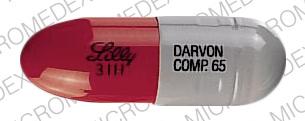Aspirin/caffeine/propoxyphene Interactions
There are 910 drugs known to interact with aspirin/caffeine/propoxyphene, along with 34 disease interactions, and 5 alcohol/food interactions. Of the total drug interactions, 353 are major, 530 are moderate, and 27 are minor.
- View all 910 medications that may interact with aspirin/caffeine/propoxyphene
- View aspirin/caffeine/propoxyphene alcohol/food interactions (5)
- View aspirin/caffeine/propoxyphene disease interactions (34)
Most frequently checked interactions
View interaction reports for aspirin / caffeine / propoxyphene and the medicines listed below.
- Ancef (cefazolin)
- Aspirin Low Strength (aspirin)
- Azithromycin Dose Pack (azithromycin)
- Benadryl Allergy (diphenhydramine)
- BuSpar (buspirone)
- Caltrate 600+D (calcium / vitamin d)
- Celebrex (celecoxib)
- Chantix (varenicline)
- Cheratussin AC (codeine / guaifenesin)
- Coumadin (warfarin)
- Cymbalta (duloxetine)
- Depakote (divalproex sodium)
- Elavil (amitriptyline)
- Fentanyl Transdermal System (fentanyl)
- Flexeril (cyclobenzaprine)
- Keppra (levetiracetam)
- Lidoderm (lidocaine topical)
- Lortab (acetaminophen / hydrocodone)
- Metoprolol Tartrate (metoprolol)
- Morphine Sulfate ER (morphine)
- Myrbetriq (mirabegron)
- Neurontin (gabapentin)
- Norco (acetaminophen / hydrocodone)
- Omega-3 (omega-3 polyunsaturated fatty acids)
- Opium Tincture, Deodorized (opium)
- Percocet (acetaminophen / oxycodone)
- Percocet 10 / 650 (acetaminophen / oxycodone)
- Phenytoin Sodium, Extended Release (phenytoin)
- Reglan (metoclopramide)
- Xanax (alprazolam)
Aspirin/caffeine/propoxyphene alcohol/food interactions
There are 5 alcohol/food interactions with aspirin / caffeine / propoxyphene.
Aspirin/caffeine/propoxyphene disease interactions
There are 34 disease interactions with aspirin / caffeine / propoxyphene which include:
- coagulation
- cardiac disease
- hypertension
- psychiatric disorders
- PUD
- impaired GI motility
- infectious diarrhea
- prematurity
- asthma
- acute alcohol intoxication
- drug dependence
- hypotension
- intracranial pressure
- respiratory depression
- gastrointestinal obstruction
- GI toxicity
- renal dysfunction
- Reye's syndrome
- cardiotoxicity
- liver disease
- renal dysfunction
- seizure disorders
- GERD
- adrenal insufficiency
- liver disease
- renal dysfunction
- seizure disorders
- urinary retention
- arrhythmias
- biliary tract disease
- anemia
- dialysis
- G-6-PD deficiency
- hepatotoxicity
More about aspirin / caffeine / propoxyphene
- Compare alternatives
- Reviews (7)
- Side effects
- Dosage information
- During pregnancy
- Drug class: narcotic analgesic combinations
Related treatment guides
Drug Interaction Classification
| Highly clinically significant. Avoid combinations; the risk of the interaction outweighs the benefit. | |
| Moderately clinically significant. Usually avoid combinations; use it only under special circumstances. | |
| Minimally clinically significant. Minimize risk; assess risk and consider an alternative drug, take steps to circumvent the interaction risk and/or institute a monitoring plan. | |
| No interaction information available. |
See also:
Further information
Always consult your healthcare provider to ensure the information displayed on this page applies to your personal circumstances.


